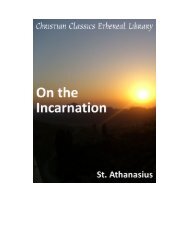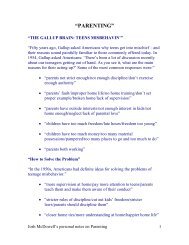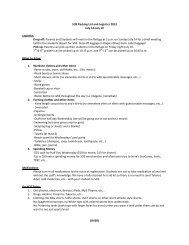Pdf Copy of Orthodoxy, by G.K. Chesterton - Christ United Methodist ...
Pdf Copy of Orthodoxy, by G.K. Chesterton - Christ United Methodist ...
Pdf Copy of Orthodoxy, by G.K. Chesterton - Christ United Methodist ...
You also want an ePaper? Increase the reach of your titles
YUMPU automatically turns print PDFs into web optimized ePapers that Google loves.
9/ 27/ 12 The Pr oject G ut enber g eBook <strong>of</strong> O r t hodoxy, G . K. Chest er t on<br />
www. gut enber g. or g/ f iles/ 16769/ 16769- h/ 16769- h. ht m<br />
no one for the birthday present <strong>of</strong> birth?<br />
There were, then, these two first feelings, indefensible and indisputable. The world was a<br />
shock, but it was not merely shocking; existence was a surprise, but it was a pleasant<br />
surprise. In fact, all my first views were exactly uttered in a riddle that stuck in my brain from<br />
boyhood. The question was, "What did the first frog say?" And the answer was, "Lord, how<br />
you made me jump!" That says succinctly all that I am saying. God made the frog jump; but<br />
the frog prefers jumping. But when these things are settled there enters the second great<br />
principle <strong>of</strong> the fairy philosophy.<br />
Any one can see it who will simply read "Grimm's Fairy Tales" or the fine collections <strong>of</strong> Mr.<br />
Andrew Lang. For the pleasure <strong>of</strong> pedantry I will call it the Doctrine <strong>of</strong> Conditional Joy.<br />
Touchstone talked <strong>of</strong> much virtue in an "if"; according to elfin ethics all virtue is in an "if." The<br />
note <strong>of</strong> the fairy utterance always is, "You may live in a palace <strong>of</strong> gold and sapphire, if you<br />
do not say the word 'cow'"; or "You may live happily with the King's daughter, if you do not<br />
show her an onion." The vision always hangs upon a veto. All the dizzy and colossal things<br />
conceded depend upon one small thing withheld. All the wild and whirling things that are let<br />
loose depend upon one thing that is forbidden. Mr. W.B. Yeats, in his exquisite and piercing<br />
elfin poetry, describes the elves as lawless; they plunge in innocent anarchy on the unbridled<br />
horses <strong>of</strong> the air—<br />
"Ride on the crest <strong>of</strong> the dishevelled tide,<br />
And dance upon the mountains like a flame."<br />
It is a dreadful thing to say that Mr. W.B. Yeats does not understand fairyland. But I do say<br />
it. He is an ironical Irishman, full <strong>of</strong> intellectual reactions. He is not stupid enough to<br />
understand fairyland. Fairies prefer people <strong>of</strong> the yokel type like myself; people who gape<br />
and grin and do as they are told. Mr. Yeats reads into elfland all the righteous insurrection <strong>of</strong><br />
his own race. But the lawlessness <strong>of</strong> Ireland is a <strong>Christ</strong>ian lawlessness, founded on reason<br />
and justice. The Fenian is rebelling against something he understands only too well; but the<br />
true citizen <strong>of</strong> fairyland is obeying something that he does not understand at all. In the fairy<br />
tale an incomprehensible happiness rests upon an incomprehensible condition. A box is<br />
opened, and all evils fly out. A word is forgotten, and cities perish. A lamp is lit, and love<br />
flies away. A flower is plucked, and human lives are forfeited. An apple is eaten, and the<br />
hope <strong>of</strong> God is gone.<br />
This is the tone <strong>of</strong> fairy tales, and it is certainly not lawlessness or even liberty, though men<br />
under a mean modern tyranny may think it liberty <strong>by</strong> comparison. People out <strong>of</strong> Portland<br />
Gaol might think Fleet Street free; but closer study will prove that both fairies and journalists<br />
are the slaves <strong>of</strong> duty. Fairy godmothers seem at least as strict as other godmothers.<br />
Cinderella received a coach out <strong>of</strong> Wonderland and a coachman out <strong>of</strong> nowhere, but she<br />
received a command—which might have come out <strong>of</strong> Brixton—that she should be back <strong>by</strong><br />
twelve. Also, she had a glass slipper; and it cannot be a coincidence that glass is so common<br />
a substance in folk-lore. This princess lives in a glass castle, that princess on a glass hill; this<br />
one sees all things in a mirror; they may all live in glass houses if they will not throw stones.<br />
For this thin glitter <strong>of</strong> glass everywhere is the expression <strong>of</strong> the fact that the happiness is<br />
bright but brittle, like the substance most easily smashed <strong>by</strong> a housemaid or a cat. And this<br />
30/ 100





